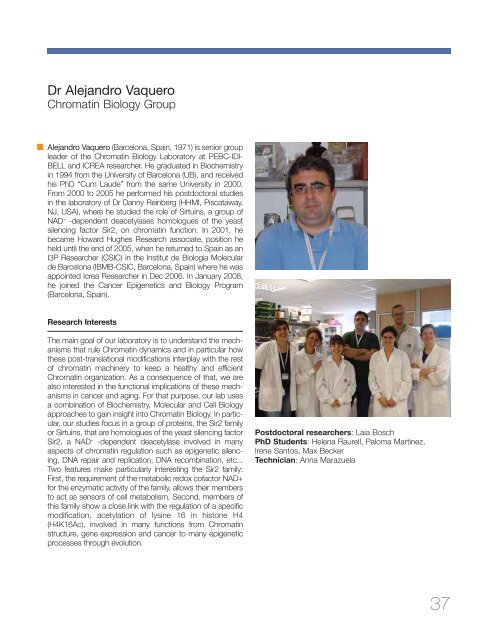PEBC Report - Programa de Epigenética y BiologÃa del Cáncer
PEBC Report - Programa de Epigenética y BiologÃa del Cáncer
PEBC Report - Programa de Epigenética y BiologÃa del Cáncer
You also want an ePaper? Increase the reach of your titles
YUMPU automatically turns print PDFs into web optimized ePapers that Google loves.
Dr Alejandro Vaquero<br />
Chromatin Biology Group<br />
Alejandro Vaquero (Barcelona, Spain, 1971) is senior group<br />
lea<strong>de</strong>r of the Chromatin Biology Laboratory at <strong>PEBC</strong>-IDI-<br />
BELL and ICREA researcher. He graduated in Biochemistry<br />
in 1994 from the University of Barcelona (UB), and received<br />
his PhD “Cum Lau<strong>de</strong>” from the same University in 2000.<br />
From 2000 to 2005 he performed his postdoctoral studies<br />
in the laboratory of Dr Danny Reinberg (HHMI, Piscataway,<br />
NJ, USA), where he studied the role of Sirtuins, a group of<br />
NAD + -<strong>de</strong>pen<strong>de</strong>nt <strong>de</strong>acetylases homologues of the yeast<br />
silencing factor Sir2, on chromatin function. In 2001, he<br />
became Howard Hughes Research associate, position he<br />
held until the end of 2005, when he returned to Spain as an<br />
I3P Researcher (CSIC) in the Institut <strong>de</strong> Biologia Molecular<br />
<strong>de</strong> Barcelona (IBMB-CSIC, Barcelona, Spain) where he was<br />
appointed Icrea Researcher in Dec 2006. In January 2008,<br />
he joined the Cancer Epigenetics and Biology Program<br />
(Barcelona, Spain).<br />
Research Interests<br />
The main goal of our laboratory is to un<strong>de</strong>rstand the mechanisms<br />
that rule Chromatin dynamics and in particular how<br />
these post-translational modifications interplay with the rest<br />
of chromatin machinery to keep a healthy and efficient<br />
Chromatin organization. As a consequence of that, we are<br />
also interested in the functional implications of these mechanisms<br />
in cancer and aging. For that purpose, our lab uses<br />
a combination of Biochemistry, Molecular and Cell Biology<br />
approaches to gain insight into Chromatin Biology. In particular,<br />
our studies focus in a group of proteins, the Sir2 family<br />
or Sirtuins, that are homologues of the yeast silencing factor<br />
Sir2, a NAD + -<strong>de</strong>pen<strong>de</strong>nt <strong>de</strong>acetylase involved in many<br />
aspects of chromatin regulation such as epigenetic silencing,<br />
DNA repair and replication, DNA recombination, etc...<br />
Two features make particularly interesting the Sir2 family:<br />
First, the requirement of the metabolic redox cofactor NAD+<br />
for the enzymatic activity of the family, allows their members<br />
to act as sensors of cell metabolism. Second, members of<br />
this family show a close link with the regulation of a specific<br />
modification, acetylation of lysine 16 in histone H4<br />
(H4K16Ac), involved in many functions from Chromatin<br />
structure, gene expression and cancer to many epigenetic<br />
processes through evolution.<br />
Postdoctoral researchers: Laia Bosch<br />
PhD Stu<strong>de</strong>nts: Helena Raurell, Paloma Martinez,<br />
Irene Santos, Max Becker<br />
Technician: Anna Marazuela<br />
37


